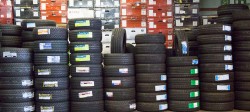 Winter & All Season Tires, what’s the difference? Many Albertans switch tires between all-season tires and winter tires as the weather and seasons change. Deciding between purchasing winter tires and all-season tires can be tricky if you don’t know anything about tires. Is it really necessary to change rims and tires at the start and end of every season? Why are some tires a lot more expensive than others, and what are some of the main differences between a below-average, good, great, or excellent winter or all-season tire?
Winter & All Season Tires, what’s the difference? Many Albertans switch tires between all-season tires and winter tires as the weather and seasons change. Deciding between purchasing winter tires and all-season tires can be tricky if you don’t know anything about tires. Is it really necessary to change rims and tires at the start and end of every season? Why are some tires a lot more expensive than others, and what are some of the main differences between a below-average, good, great, or excellent winter or all-season tire?
Winter & All Season Tires Rims & Tires Swap?
Many Albertans switch tires between all-season tires and winter tires as the weather and seasons change. Deciding between purchasing winter tires and all-season tires can be tricky if you don’t know anything about tires. Is it really necessary to change rims and tires at the start and end of every season? Why are some tires a lot more expensive than others, and what are some of the main differences between a below-average, good, great, or excellent winter or all-season tire?
Winter & All Season Tires Manufacturers & Brands
Tires are not all made equal. And several manufacturers employ various materials and procedures. Some parts of Canada have made tire changes required throughout the winter months, particularly in areas with plenty of snow and high terrain, such as British Columbia. Alberta does not have laws in place that make seasonal tire changes mandatory, probably because the province is mostly flat. There is no doubt that a good set of winter tires are going to be much safer and perform much better in extreme cold, frozen, and snowy conditions than good or excellent all-season tires.
Winter & All Season Tires vs Truck & SUV Myths
Some people think that having a 4×4 SUV or truck makes winter driving more manageable, and maybe they don’t need winter tires. Although there are many benefits to a 4×4 or AWD vehicle in the ice and snow, there are also some drawbacks. For example, a 4×4 will get more traction when taking off from a set of lights, or not spin as easily when the accelerator is pressed, but some drivers fail to realize stopping in a 4×4 or 4×2 vehicle is the same. When applying brakes there is absolutely zero advantage to the 4×4 or AWD system. The difference in how quickly you can stop is dependent on the ABS and the type of tire on the vehicle. Winter tires will reduce the stopping distance more than all-season tires when it comes down to the tire compound and how well it grips ice and snow.
Winter & All Season Tires Construction
Winter tires are constructed of a rubber and silica composition designed to remain softer even in extremely frigid temperatures. The softer the rubber tire, the better it grips the road, unlike a firm rubber tire. A softer flexible rubber compound tire is the inverse of a hard rubber compound hockey puck, which helps the puck to slide better on the ice. The leading tire manufacturers are constantly testing and upgrading the compounds of their tires. Some of the very best winter tires for Canadian winters are a little pricey but are well worth the money Top brands are Michelin X-ICE, Nokian Hakkapeliitta, Bridgestone Blizzak, and a few more. Best practices are to check tire buyer reviews, and make notes.
All-season tires are comprised of durable rubber and perform well in hot to chilly temperatures, as well as in the rain and somewhat cool weather. Whether you choose to switch over to winter tires or use all-season tires year-round, do your research to determine whether switching is beneficial to you and if it suits your lifestyle.
Personally, living in Alberta for over 50 years, I can tell you that tires have changed over the past few decades, and I always switch over to good winter tires.
